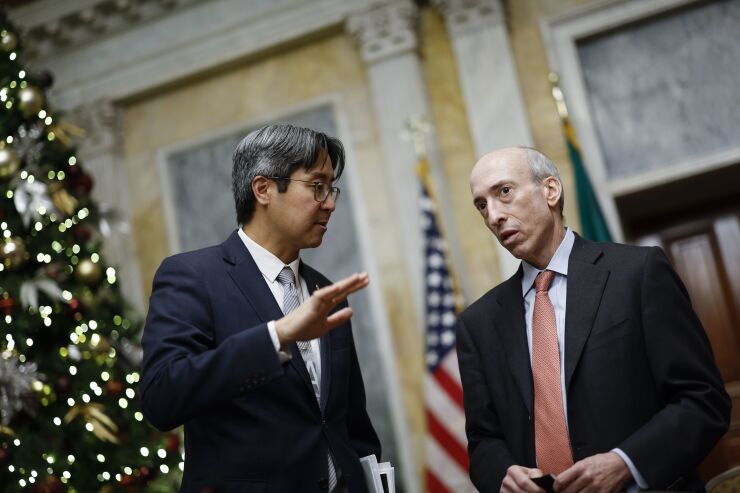
WASHINGTON — In remarks at a press briefing Wednesday at the Office of the Comptroller of the Currency, Acting Comptroller Michael J. Hsu said he believes the banking system has been well insulated from the recent volatility in the crypto industry, and said interest from banks in servicing crypto clients has receded since the failure of FTX last November.
Hsu said an
"I think [the guidance has] withstood the test of time fairly well," he said. "You've had a fair amount of turmoil in the crypto space. Aside from Silvergate and some of the contagion from that, the cross-contagion to the banking system has been relatively contained."
While he says regulators continue to expect banks to responsibly approach dealing in digital assets, he said he was less concerned with bank forays into digital assets today than he was a year ago.
"The [fear of missing out] on crypto has gone down this year, and I think that's really largely due to the events of last year," Hsu said. "Crypto winter was pretty tough for the crypto industry. Those who I put into the bucket of 'crypto curious' on the banking side lost some of that curiosity given some of those events. The issue of scams, fraud [and] hacks … have not gotten better over time. So that issue has kind of receded in terms of materiality. It's something we care about. It's something we still expect banks to approach prudently, but I'm just not hearing as much noise or demand for banks to get in on crypto."
While the hype around crypto appears to be dying down, Hsu said he believes that some of the underlying technology of cryptocurrencies — namely private blockchains — could hold promise for banks. When asked about potential use cases for crypto technology, Hsu said payment settlement is the most obvious use case for blockchain.
"The primary problem [blockchain] is well suited to solve is settlement efficiency," Hsu noted. "If you tokenize things then you can achieve some settlement efficiencies, [as in] cross-border payments. That's a use case for blockchain technology that's both innovative and worth exploring."
Like his
"Public blockchains are tough for a whole bunch of different reasons," he said. "One is they're not very efficient, the other is they're very challenging to get full compliance on BSA/AML [Bank Secrecy Act / Anti-Money Laundering]. So the tokenization initiatives we've seen are almost all using private blockchain technology. That's, I think, an area where innovation based on blockchain technology has some promise."
Hsu also addressed recent concerns from bank trade groups that merger decisions have been stalled indefinitely by requiring more and more information from involved parties. Hsu reiterated that mergers are only valuable to the extent that they are beneficial to the institutions and the communities they serve, and that legally, regulators have to evaluate the full health and statutory adherence of each merger. He does believe the competition framework the agency and the Justice Department use to evaluate mergers for antitrust could use an update, but he made clear the agency is not bowing to external pressure.
"The competition framework has not been updated since 1995. And so that's something that we are working with the Department of Justice on," Hsu said. "That doesn't change the underlying statutory requirements, or the underlying thesis, which is that healthy mergers are good. unhealthy mergers are not good and we have to apply scrutiny for whatever comes through the door."
He also reflected on recent bank failures, saying the root cause for the failures were ultimately the firms' poor risk management. He added that both the Fed and FDIC's post-mortem reports revealed the need to further empower supervisors to elevate and act upon problems they found at institutions in a timely manner.
"Supervisors need to act — it's not just good enough to see something, say something and then act," he said. "That risk management part and that discretion part are kind of the primary things that would have prevented Silicon Valley or Signature from happening."
Hsu indicated that in light of the recent turmoil in the industry, regulators agree nearly unanimously on the need for banks to hold stronger levels of capital.
"Strong capital is good. I believe that. Between me and my counterpart at the Fed and the FDIC, I think we're fairly aligned on how we're thinking about that," he said.
He said regulators will carefully consider the
"We have to be thoughtful and smart about how we calibrate what we think the outcome should be, and then the transition periods for getting there. That's always the case for especially those kinds of really consequential rules related to capital, liquidity etc.," he said. "We're being extra thoughtful about how we think about both the calibration, transition period and tradeoffs. Banks have not been shy about sharing their concerns about some of those tradeoffs, and we're taking those into account."
Hsu reiterated that, just as he and the heads of the Fed and FDIC testified at the latest round of regulatory oversight hearings, the agencies are committed to issuing a proposal on executive compensation, though he said further details will be forthcoming.
"The direction of travel is pretty clear," he said. "To strengthen accountability for executives."






